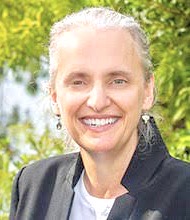By Jennifer Jones, Florida Gulf Coast University
It’s time to give up on saving the planet. Nature is screwed, so don’t bother caring about the environment. In the new year, put concern for clean air and water behind you and find other things to focus on.
Or not. Maybe there are reasons to believe in caring for nature. Recently, leaders from more than 190 countries met in Montreal to safeguard biodiversity — the variety of life on this planet, from individual species to whole ecosystems.
In the final hours of a two-week conference, they agreed to protect 30% of the planet’s land and water by 2030. While the so-called 30×30 plan is not legally binding and the United States is famously not part of this, nor many other international environmental treaties, it’s an important step in the right direction.
Global biodiversity is under immense threat as our impact on this planet grows. Our love of cheap burgers means we continue to chop down forests to farm more cows.

Unsustainable fishing and pollution threaten our oceans. For every pound of tuna we remove from the ocean, we replace it with two pounds of plastic, according to the World Economic Forum. And human-driven climate change has intensified droughts, floods and warmed ocean waters making it harder for plants, animals, and ecosystems to survive.
While we used to think protecting nature was saving polar bears and pandas, we have come to understand that what’s good for wildlife is good for people. Conserving mangroves saves habitat for fish and manatees but also provides a storm buffer and job engine for our community.
Only 17% of land and 8% of oceans is under some form of protection, so the 30×30 goal is ambitious, but not impossible.
If you are a newcomer to Florida, it might be hard to fathom, but alligators almost went extinct just a few decades ago. Due to unregulated hunting and the trade in alligator hides, they were declared an endangered species in the 1960s.
Through policy and enforcement, the alligator population recovered enough so that they were removed from endangered species status in the late 1980s. It was a similar story with Florida’s birds that were almost wiped out over 100 years ago as their plumes were sought to adorn fashionable hats.
The policies ultimately used to protect these birds served as a catalyst for Florida’s conservation movement. There was a time when Floridians did not know a future with Everglades National Park, Six Mile Cypress Slough Preserve or Lovers Key State Park. Now it’s impossible to imagine a future without them.
These success stories illustrate that when confronted with the harsh reality of our behavior, we can choose to do better. This moment in time is different because the threats are bigger, requiring a bigger and quicker response. It won’t be enough to simply remove hunting pressure on a few species when we are paving over entire ecosystems.
To be sure, some will argue that protecting humans should come before the needs of wetlands, wild grasses and coral reefs. But nature is our best insurance for the future. Biodiversity provides our air, food, water, medicines, jobs, recreation and so much more. It makes all of us safer in the face of climate change.
A new year brings possibility and hope. Resolutions to do better. We can and should do more to protect all living things on this planet and ultimately ourselves.
Jennifer Jones, Ph.D., is director of the Center for Environment & Society, part of The Water School at Florida Gulf Coast University.
“The Invading Sea” is the opinion arm of the Florida Climate Reporting Network, a collaborative of news organizations across the state focusing on the threats posed by the warming climate.



